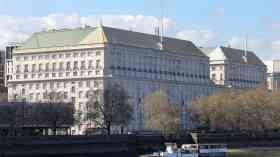Concrete Canvas Ltd is proud to be exhibiting at the International Security Expo for the first time, as we celebrate our 20th year in business.
Austerity hitting Labour councils harder than Tory areas
New analysis, seen by the Guardian, has revealed that Labour councils have borne the brunt of local government cuts over a decade of austerity.
The findings highlight the extent to which poorer, largely Labour-held areas of England have had their funding slashed, on average, by at least a third, while more affluent, largely Conservative areas received greater protection.
The analysis, carried out with Sigoma, arrives exactly a decade since the then Chancellor George Osborne pledged to protect the most vulnerable in society whilst announcing the deepest period of cuts to public service spending since the second world war.
Sigoma shows that, on average, Labour councils saw their spending power reduced by 34 per cent, while the average Conservative council suffered an equivalent decline of 24 per cent. Of the 50 councils which received the deepest budget cuts, 28 were Labour controlled in 2010, while just six were Conservative. The remainder were Liberal Democrat controlled (two) or had no overall control (14).
By the end of the decade, the disparity had widened, with 38 of the 50 worst-hit councils being Labour-controlled while only five were Conservative authorities.
The analysis shows that Hackney council reported the biggest percentage cut of any council, losing £180 million in real terms, representing a 41 per cent decline in its spending power. Newham, Knowsley and Manchester all suffered similarly deep cuts. All are also Labour areas with high levels of deprivation.
Labour council leaders from the worst-hit areas have told the Guardian that the cuts were so politically skewed as to feel like electoral manipulation.
Urban areas tended to see deeper cuts than rural areas. Inner London boroughs and metropolitan areas outside of the capital both received budgets cut of more than a third, while district and county councils in rural areas lost 22 per cent of their budgets.
Richard Watts, Labour leader of Islington council and chair of the Local Government Association resources board, said: “It was very clear right from the beginning that Labour areas were being hit harder because of the way the government changed how central government funding for councils was calculated. They took away specific grants targeted at deprived areas, and later started stripping out the deprivation weighting from the funding formula.
Company Focus
Event Diary
Join us for the landmark 10th Anniversary of the London Build Expo, the UK’s largest and most influential construction and design show.
Retail Supply Chain & Logistics Expo returns to Excel London across 12-13 November, once again bringing together the world of logistics, supply chain, eCommerce and retail innovation for two dynamic days of opportunity.
Every sport, from grassroots football to world-class tournaments, depends on one constant: high-quality playing surfaces and well-maintained green spaces.
Supplier Profiles
Bauder Accepts Keys to its New UK Distribution Centre at Gateway 14
Bauder marked a major milestone in its UK expansion with the official handover of a brand
Words of World: Bridging language barriers with excellence
At Words of World, we specialise in professional translation and interpreting, d
Latest Features
The British Institute of Cleaning Science (BICSc) and the Cleaning & Support Services Association (CSSA) have successfully completed a groundbreaking project aimed at exploring the future of cleaning. This collaboration marks a significant milestone in the cleaning industry, reflecting a shared commitment to embracing innovation with confidence.
The Crown Commercial Service’s (CCS) new framework on Language Services (RM6302), dealing with translation, transcription and interpreting, is live, running from 7th May 2025 to 6th May 2028.














